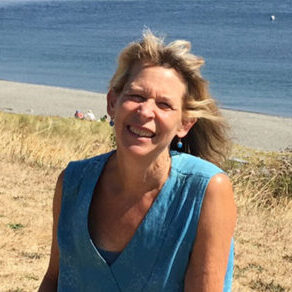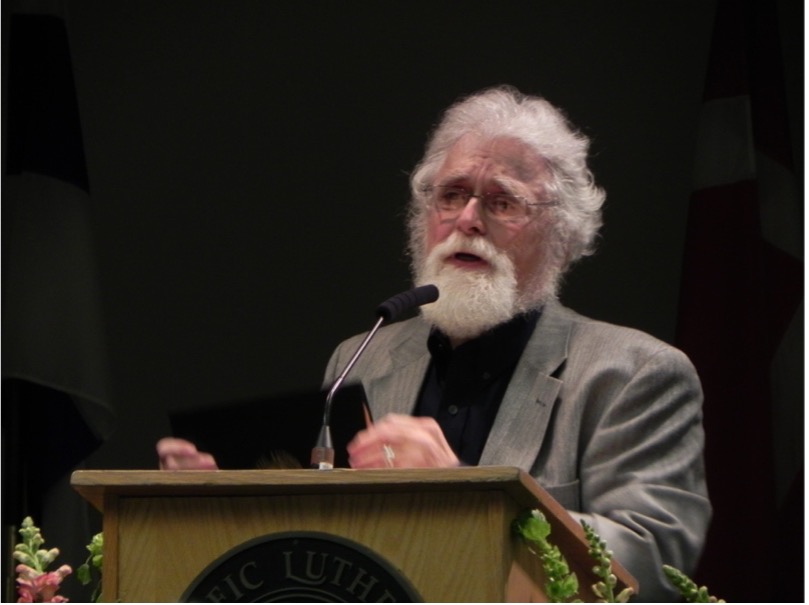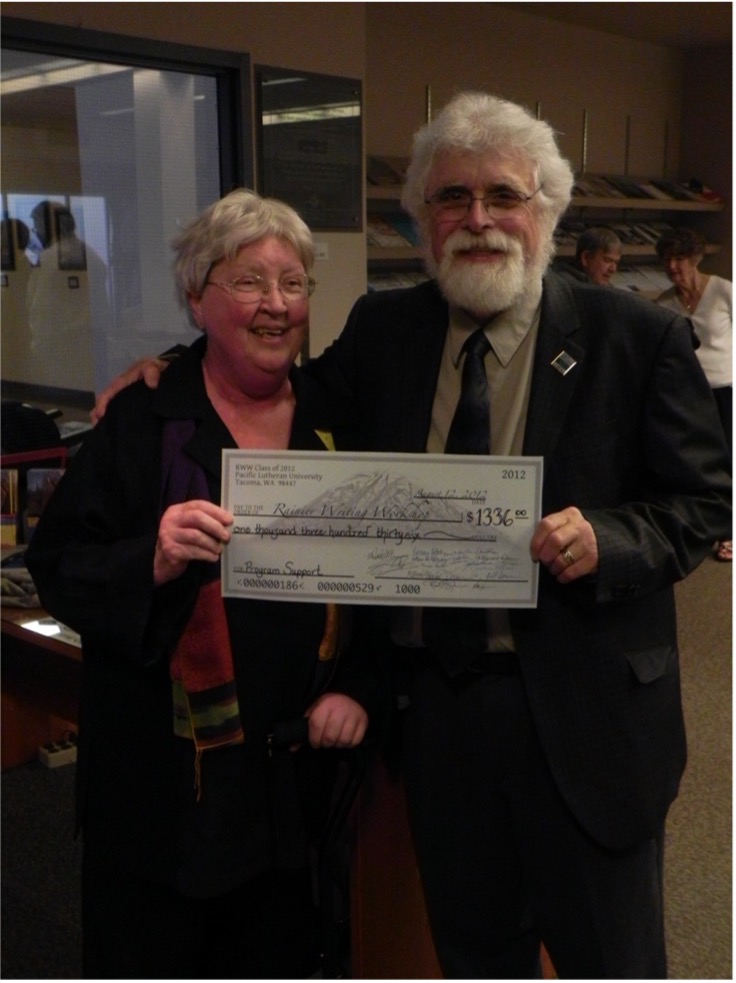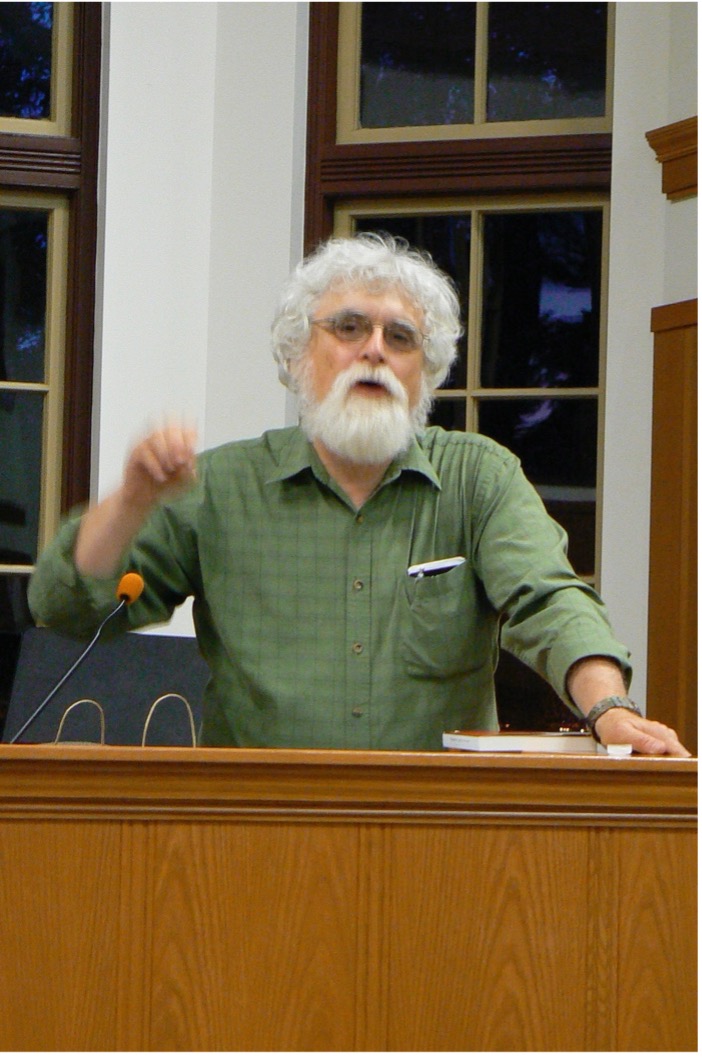Summer 2024
4
Now, It’s All Nostalgia & a Bit of a Miracle:
An Interview with Stan Rubin, Co-Founder & Former Director of RWW
Holly J. Hughes, Former OE Coordinator (Class of 2006)
Now, It’s All Nostalgia & a Bit of a Miracle:
An Interview with Stan Rubin, Co-Founder & Former Director of RWW

Holly J. Hughes
Former OE Coordinator
Class of 2006
I met Stan for lunch on a brisk, sunny late afternoon in late May. We sat out on the back deck outside Aldrich’s with bowls of soup and reminisced about the first years of the program, twenty years ago now, in 2004. I can still remember the sense of anticipation laced with trepidation I felt on arriving at the PLU campus on a sweltering day in early August and meeting Stan, Judith, the faculty, and the other members of the inaugural class for the first time. As the week unfolded, the trepidation faded, replaced by elation as we all got to know the faculty, weathered our first workshop, shared picnics on the patio, and began forming bonds that for my cohort—and I suspect all subsequent cohorts—continue to this day.
This meeting gave me a chance to ask all the questions I’d never asked about the founding of the program, as well as catch up on the publishing successes of RWW alums. What follows is a condensed version of a meandering conversation that took place over several hours.
***
Holly Hughes: Stan, I remember so well that first year—hard to believe it’s twenty years ago now!—arriving at the Scan Center for orientation and being given elaborate color-coded schedules for the residency: workshops, craft talks, and readings. I was so grateful for Judith’s “Schedule at a Glance” page! I’d love to hear about both your vision and all the work that preceded that first residency. How did the program come about? What were the seeds? And how did it end up here in the Northwest instead of New York, where you and Judith were teaching?
Stan Rubin: Judith and I were married and had been a literary team for a number of years at State University of New York—Brockport. I’d been running the Brockport Writer’s Forum and Video Library and the Summer Writing Workshops. We were looking to move elsewhere. Judith was invited to be a guest writer at Centrum by Sam Hamill and I came with her. We’d wanted to do something out in this part of the world. While we were here, we looked for low-residency MFA programs, and there weren’t any then. Recognizing a need, we approached a few colleges and got a very positive response from PLU. That was 2003. A year later, in early August, we were greeting you all.
We put together our own proposal for the program—we felt strongly about that. We were only interested in running an MFA program if we could design it. We both knew a lot of writers—we were well connected in the literary world—and knew we could find good faculty to teach in it, which we did.

HH: What was your vision for the program? How did it differ from other low-residency MFA programs?
SR: Judith had attended Warren Wilson’s MFA program and I knew a lot about MFA programs. We wanted to design a program that would work for working adults, not just for younger students. We wanted grown-ups—people who’d failed a few times along the way, but had the character, talent, and drive to go further. We wanted people who wanted to be part of this program, who understood our vision and were ready to take on responsibility in their own lives. We knew we could build a credible program if we were allowed to do it our way, and PLU was open to that.
PLU was unique then in that the decision for new programs was made by faculty. We presented our program to the Faculty Senate and it was enthusiastically received. Our timing was good. Not only were the dean and the English Department supportive, but President Loren Anderson gave us money out of the presidential fund that first year. I remember the call came late on a Friday afternoon that the faculty had voted unanimously to approve it—we were told we were the first new program that ever got 100% approval—and I walked over to my dean at SUNY and gave notice.
HH: From my perspective as a student, then as the Outside Experience Coordinator, one of the great strengths of RWW has always been the quality of the faculty. They have all been not only stellar writers, but also gifted teachers and mentors who appreciate each other’s work. There wasn’t the sense of competition that you see at some MFA programs, but a sense of collaboration and respect among the faculty that appealed to me right away. How did you choose which faculty to invite? What were your criteria?
SR: We picked people largely who we knew, but not necessarily our best friends. In some cases, we took a chance on writers we’d met just briefly or heard about, like Kent Meyers—Judy met him when she was judging a fiction contest. Ann Pancake and Dinah Lenney were both suggested to us by people we knew and respected.
We took many counterintuitive risks to achieve our vision of responsibility and excellence. We wanted to give students the option to study more than one genre, so one of our goals was to hire writers who had strengths in writing and teaching in multiple genres. We looked for writers who’d be intellectually challenging to students, too. We believed in the mind. We recruited people who didn’t want to be on a “ladder”—not jockeying for position as you so often see in academia.
“We believed in the mind. We recruited people who didn’t want to be on a ‘ladder’—not jockeying for position as you so often see in academia.”
HH: What about recruiting the participants? Everyone I met that first year seemed so well suited for the program you and Judith created, myself included. I was attracted by the opportunity to study more than one genre—and not having to fly across the country twice a year (I’d considered attending Warren Wilson).
SR: We were enormously lucky. Through extensive recruiting, we attracted the right people as participants. We admitted people who hadn’t necessarily published extensively, and in one or two cases, had never taken creative writing as a class, but who had a passion for writing. We were also looking for people who were self-directed and motivated. Our idea from the start was choice, individual growth, and ongoing progress measured not by jumping through academic hoops to a degree as reward, but real development in collaboration with a mentor who has a similar goal. We developed and reshaped elements based on that, including our system of two-way narrative evaluations and the mutually determined individualized reading lists at each stage. As I mentioned earlier, one of the other things we did that was unique is that we didn’t admit students to a specific genre. With an eye on their writerly growth, we gave them permission to change genres—or in some cases, to do a multi-genre thesis.
For those without much publishing experience who might be feeling insecure, we designed the residency to help everyone gain confidence. As you remember, before the residency began, we invited a graduate to give the opening graduate reading—so the participants could see what was possible. I was responsible for finding the right students, and Judy figured out schedules and the day-to-day details of the residency; as you know, her mathematical genius played a significant role in this, too.

HH: Yes, and I remember that Judith had a gift for assigning roommates—I’m so grateful for my ongoing friendship with my roommate Katie Humes—and for assigning mentors. We learned quickly not to be disappointed if we didn’t receive the mentor we’d requested; Judith always knew best who we needed to work with next. What were you looking for in the thesis?
SR: The thesis had to be serious, to show real engagement. We wanted participants to be able to demonstrate that they were writing on a more confident and daring level than before. Many students did end up with published books, but many also are making significant contributions to the literary community—alumni like Billie Swift, who owns Open Books. We were happy for those who did get teaching jobs or ran literary centers, too.
Out of those early classes, three participants are now on faculty at RWW: Barrie Jean Borich, April Ayers Lawson, and Kelli Russell Agodon.
HH: What about the Outside Experience? As you remember, for me, the OE was a significant project and eventually resulted in my first publication—and I believed in its value so strongly that I spent the next twelve years as OE Coordinator, thanks to you and Judith entrusting me with it.
SR: We wanted each participant to design something with us—an internship, travel, residency, teaching—that would send them outside the program into the world that hopefully would bear fruit in their thesis. As you know, the idea had to be approved—you couldn’t do just anything—and in many cases, participants surprised us. The other thing that I’m proud of is that we set it up so everything we did fed everything else. When the second-year students present their Outside Experiences, the first-year students are inspired and often come away from it with ideas for what they might do. In the end, we were proud of that element of the program. We wanted something to help you live a better, more fulfilling life, not just focus on achievement.
“We wanted something to help you live a better, more fulfilling life, not just focus on achievement.”
HH: I think you succeeded at this, Stan. I can think of many Outside Experiences that led participants into satisfying literary work, like Erin Hollowell, who did her OE in Alaska at the Sitka Institute and is now executive director for Storyknife and directs the Kachemak Bay Writers’ Conference. Many other alumni are making contributions in the local publishing scene. Jill McCabe Johnson is founder and editor-in-chief at Wandering Aengus Press and its imprint Trail to Table Books, where two other RWW alums are on the staff: Julie Riddle as Creative Nonfiction Editor and Tina Schumann as poetry editor. Michael Schmeltzer has been President of Floating Bridge Press for several years as well as the author of several poetry collections. Kelli Russell Agodon is co-publisher of Two Sylvias Press, and I’m co-publisher of Empty Bowl Press.
All these accomplishments lead me to my next question: How do you feel about all the recognition that RWW alums have achieved and are achieving?
SR: Well, the achievement that first year alone affirmed that our risk paid off: Kathleen Flenniken won a National Endowment for the Arts grant and her book of poems, Famous, was published. She went on to become our second Washington State Poet Laureate. Margie Lukas wrote a short story that was adapted into a movie that won a prize at Cannes. You published Beyond Forgetting: Poetry & Prose about Alzheimer’s Disease and later received an American Book Award. April Lawson won The Paris Review Plimpton Prize for her short story, “Virgin.” That pattern continued, too, and as the years went by, the list of achievements and accomplishments grew: Kate Carroll de Gutes's debut book of essays, Objects in Mirror Are Closer Than They Appear, won the 2016 Oregon Book Award for Creative Nonfiction and the Lambda Literary Award in Memoir. Julie Riddle won an award from Creative Nonfiction for an essay, and Amy Andrews won a national essay contest sponsored by The Atlantic; we traveled to New York to celebrate it. In 2019, Tina Schuman published Praising the Paradox, a finalist in the National Poetry Series, the New Issues Poetry Prize, the Four Way Books Intro Prize, and others. More recently, Kristina Moriconi published another book, In the Cloakroom of Proper Musings, as did Alicia Hoffman with Animal—I follow them on Facebook.

HH: Too many to name them all! This is just a sampling and I know that trend has continued the last decade under Rick’s leadership.
Editor’s note: For a more complete list of accomplishments by RWW grads, see our Publications and Announcements sections.
You must be so proud, Stan, and I suspect Judith is proud, too, to see what everyone has achieved from your well-timed vision—and is continuing to achieve. Looking back on all this twenty years later, are there things you would have done differently?
SR: There were things we wanted to do in the early years, but we weren’t able to; we were so busy year-round running the program. One of them was to invite alumni to return for residencies, which is now happening. We didn’t record guest or craft lectures—there were just too many forms to fill out—so I’m immensely grateful that Brenda put the collection of craft lectures together that came out this year, The Next Draft: Inspiring Craft Talks from the Rainier Writing Workshop.
HH: It's now been ten years since you and Judith retired, working with Rick during the 2014 residency to ensure a smooth transition. As you reflect now, any closing thoughts?
SR: In retrospect, it was rather like a symphony orchestra, individual parts working to an overall goal, only the score hadn’t been written in advance. That was the risk, the excitement. I learned that if you trust and pick the right people, miracles will happen. I have the huge joy that the participants in the program have greatly exceeded our dreams for them and continue to do so.
Stan Sanvel Rubin, co-founding director of RWW with Judith Kitchen, has published over 300 poems in journals including AGNI, Georgia Review, Poetry Northwest, Kenyon Review, Iowa Review and others. Four full-length collections include There.Here. (Lost Horse Press) and Hidden Sequel (Barrow Street Poetry Book Prize). He served as essay-reviewer of Poetry for Water-Stone Review and as elected chair of the Low Residency Director’s caucus of AWP, helping formulate standards for such programs. Previously at SUNY, he was director of the Brockport Writers Forum and Video Library and founding director of the Brockport Summer Writing Workshops.
Holly J. Hughes is the author of four collections of poetry, most recently Hold Fast, coauthor of The Pen and The Bell: Mindful Writing in a Busy World, and editor of several anthologies. Her fine art chapbook Passings received an American Book Award in 2017. She was a member of the Rainier Writing Workshop’s first graduating class, then served as the Outside Experience coordinator for 13 years, in addition to teaching writing full time at the college level for several decades. Currently, she’s co-publisher of Empty Bowl Press, directs Flying Squirrel Studio, which offers writing residencies for women, and consults as a writing coach.
